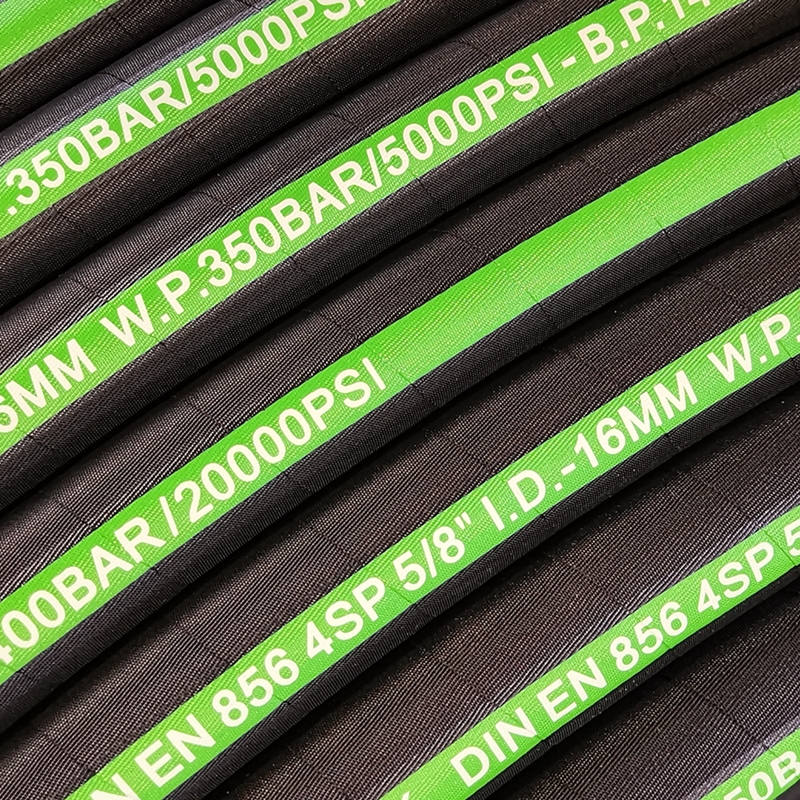nov . 15, 2024 01:37 Back to list
oil resistant hydraulic rubber hose
The Importance of Oil-Resistant Hydraulic Rubber Hoses
In various industrial applications, the need for efficient fluid transfer is paramount. Hydraulic systems, which utilize contained fluids to transmit power, are widely employed in agriculture, construction, manufacturing, and many other sectors. Within these systems, one of the critical components is the hydraulic hose. Among the many types available, oil-resistant hydraulic rubber hoses stand out due to their durability, flexibility, and resistance to oil-based fluids.
Understanding Hydraulic Hoses
Hydraulic hoses are designed to carry fluids under high pressure, ensuring that machinery operates smoothly and efficiently. The construction of these hoses typically consists of several layers an inner tube that comes into contact with the hydraulic fluid, a reinforcement layer to provide strength and pressure resistance, and an outer cover that protects the hose from external conditions.
Oil-resistant hydraulic rubber hoses are specifically engineered to withstand the detrimental effects of oil and other hydrocarbons. The rubber compounds used in these hoses are formulated to resist degradation, ensuring a much longer service life compared to standard hoses.
The Role of Oil Resistance
Oil resistance is crucial for hydraulic hoses because many fluids used in hydraulic systems contain oil or oil derivatives. Traditional rubber hoses may degrade in the presence of oil, leading to swelling, cracking, or even complete failure. An oil-resistant hose, on the other hand, is designed to maintain its integrity when exposed to oil, ensuring that the hydraulic system functions reliably under varying conditions.
Applications of Oil-Resistant Hydraulic Rubber Hoses
oil resistant hydraulic rubber hose

These hoses are utilized in numerous applications where hydraulic fluid is required to power equipment. For instance, in the construction industry, oil-resistant hydraulic hoses are commonly used in excavators, loaders, and cranes, where the risk of hose failure can result in costly downtime or even accidents.
In agriculture, machinery such as tractors and harvesters also relies on these hoses for their hydraulic systems. Given the tough working environments, with exposure to dirt, water, and various oils, using a robust hydraulic hose is essential to prevent leaks and ensure operational efficiency.
Choosing the Right Hose
Selecting the correct oil-resistant hydraulic rubber hose requires a thorough understanding of the specific application and the fluids involved. Key considerations include the hose's pressure rating, temperature range, and compatibility with the hydraulic fluid being used. It is essential to match these specifications with the requirements of the machinery to ensure safe and efficient operation.
Additionally, factors such as the operating environment, including temperature extremes and exposure to UV light or chemicals, should be considered. The right hose will exhibit not only oil resistance but also resistance to abrasion, aging, and ozone to meet the demands of harsh conditions.
Maintenance and Care
Even the best oil-resistant hydraulic rubber hoses require regular maintenance to ensure longevity. It is advisable to inspect hoses for signs of wear, such as cracking or bulging, and to check for leaks regularly. Proper installation techniques, including avoiding sharp bends and kinks, can significantly extend the life of the hose.
In conclusion, oil-resistant hydraulic rubber hoses are vital components in hydraulic systems across various industries. Their ability to withstand the damaging effects of oil ensures reliable operation, thereby enhancing productivity and safety. By choosing the right hoses and maintaining them properly, businesses can ensure that their hydraulic systems perform at peak efficiency, preventing downtime and maximizing productivity. The importance of these hoses cannot be understated, as they play a crucial role in the overall functionality of hydraulic machinery.
-
High-Quality OEM/Custom PTFE/Teflon Hose Factory in China
NewsJun.01,2025
-
Low Pressure Flexible Hydraulic Hose Durable & Affordable Steel Braid
NewsJun.01,2025
-
1 Inch ID Rubber Hose High-Pressure & Chemical Resistant
NewsMay.31,2025
-
High-Pressure 1/4" Hydraulic Hose Lines R5 Rubber, Durable & Flexible
NewsMay.31,2025
-
1SN Hydraulic Hose High Pressure, Steel Wire Braid Durability
NewsMay.31,2025
-
Smooth Cover Hydraulic Hose Supplier OEM Export Solutions
NewsMay.31,2025
